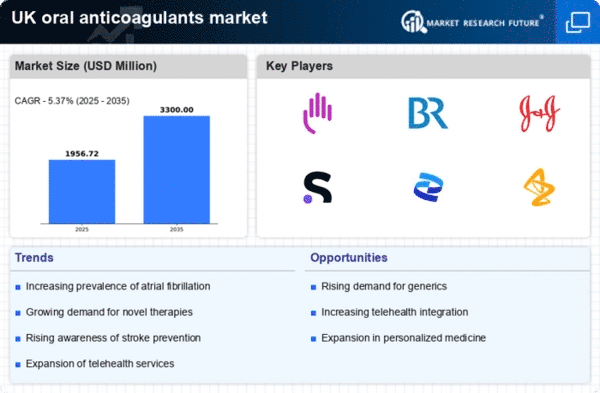Regulatory Support and Market Accessibility
Regulatory support plays a vital role in the oral anticoagulants market, influencing the accessibility and availability of these medications. The UK regulatory framework has been increasingly supportive of new drug approvals, facilitating quicker access to innovative anticoagulant therapies. The Medicines and Healthcare products Regulatory Agency (MHRA) has streamlined processes for evaluating new treatments, which may encourage pharmaceutical companies to invest in research and development. This supportive regulatory environment is likely to enhance market competition, leading to a broader range of options for healthcare providers and patients. As new oral anticoagulants receive approval and enter the market, the overall accessibility of these therapies is expected to improve, thereby driving growth in the oral anticoagulants market.
Increasing Prevalence of Cardiovascular Diseases
The rising incidence of cardiovascular diseases in the UK is a primary driver for the oral anticoagulants market. Conditions such as atrial fibrillation and venous thromboembolism are becoming more prevalent, leading to a greater need for effective anticoagulation therapies. According to recent data, approximately 1.5 million people in the UK are diagnosed with atrial fibrillation, which significantly increases the risk of stroke. This growing patient population necessitates the use of oral anticoagulants, as they are essential in managing these conditions. The oral anticoagulants market is expected to expand as healthcare providers prescribe these medications more frequently to mitigate the risks associated with cardiovascular diseases. As awareness of these conditions increases, the demand for oral anticoagulants is likely to rise, further propelling market growth.
Aging Population and Increased Healthcare Expenditure
The demographic shift towards an aging population in the UK is a crucial factor influencing the oral anticoagulants market. As individuals age, the likelihood of developing conditions that require anticoagulation therapy, such as atrial fibrillation, increases. The Office for National Statistics indicates that by 2030, the number of people aged 65 and over in the UK is projected to reach 20 million. This demographic trend is accompanied by increased healthcare expenditure, as the government allocates more resources to manage age-related health issues. Consequently, the oral anticoagulants market is poised for growth, as healthcare systems adapt to meet the needs of an older population. The combination of an aging demographic and rising healthcare budgets suggests a robust future for the oral anticoagulants market.
Advancements in Drug Formulations and Delivery Systems
Innovations in drug formulations and delivery systems are significantly impacting the oral anticoagulants market. Recent advancements have led to the development of novel anticoagulants that offer improved efficacy and safety profiles compared to traditional therapies. For instance, the introduction of direct oral anticoagulants (DOACs) has transformed treatment protocols, providing patients with more convenient dosing regimens and fewer dietary restrictions. The oral anticoagulants market is likely to benefit from these advancements, as healthcare providers increasingly adopt these newer therapies. Furthermore, ongoing research and development efforts are expected to yield even more effective formulations, potentially expanding the market further. The continuous evolution of drug delivery systems may enhance patient compliance and outcomes, thereby driving the oral anticoagulants market.
Rising Awareness and Education on Anticoagulation Therapy
The growing awareness and education surrounding anticoagulation therapy are pivotal in shaping the oral anticoagulants market. Healthcare professionals and patients are becoming more informed about the benefits and risks associated with anticoagulant use. Initiatives aimed at educating both practitioners and patients about the importance of anticoagulation therapy in preventing thromboembolic events are gaining traction. This increased awareness is likely to lead to higher prescription rates of oral anticoagulants, as patients seek effective management options for their conditions. Additionally, public health campaigns focusing on cardiovascular health are expected to further enhance understanding and acceptance of these therapies. As knowledge about anticoagulation therapy expands, the oral anticoagulants market is anticipated to experience significant growth.
















